#TBT | Animal Rights, Human Rights: An Interview With Jasmin Singer
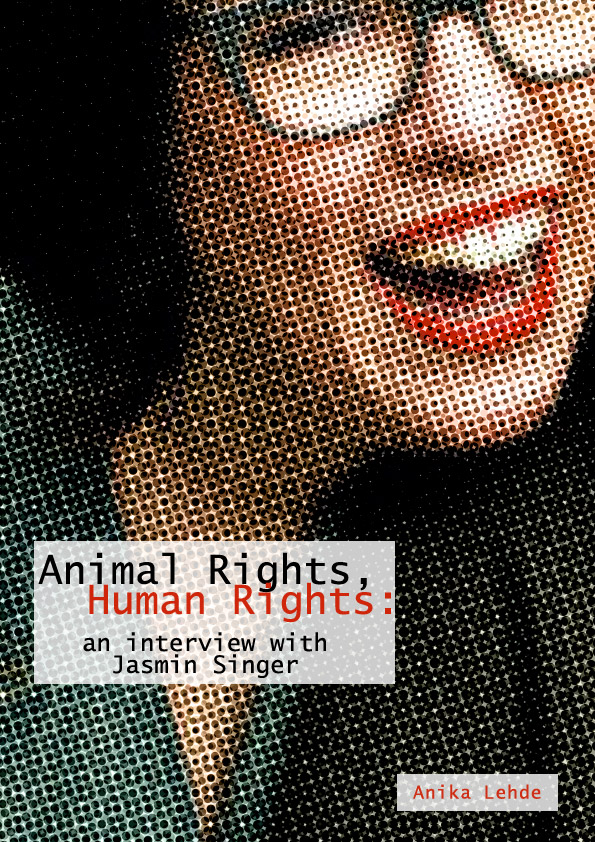
Some days we wake up, look out the window, and are a bit overwhelmed by the challenges set before us – the homeless freezing outside huge empty apartment buildings, rape culture in the Congo, denial of civil rights for gay citizens, dolphin slaughter in Taiji – it’s hard to know where to direct our efforts. Sometimes these challenges pile on our shoulders like uranium flakes. Many days we go back to bed, sluff off, ignore the weight. I know this describes me sometimes.
But a few people get up every day ready to take on these challenges and speak out on multiple fronts. A few people brush off those flakes, look trouble in the eye, and ask what they can do for their world today. One of these brave agents of history is Jasmin Singer, a writer, actor and, most importantly, an instigator of action for all animal rights, including human rights. You may know her as one of the forces behind Our Hen House, an online repository of ideas, interviews, and articles dedicated to helping others find a way to make a difference for animals. I know her as someone willing to look at the similarities between oppressions, particularly gay rights and animal rights and promote those who are bridging the connections between the two movements.
Jasmin’s first job out of college was as an AIDS-awareness educator with a theatre company called Nitestar, which went into mostly inner-cities schools to educate kids about AIDS, rape and sexuality acceptance. Once she met animal rights activists and connected the dots, she became a voice for all. In 2009, Jasmin was named by VegNews Magazine as one of their 20 Under 30 activists to watch out for, from 2007-2010 she was the campaigns manager for Farm Sanctuary, she has been featured in TimeOut NY and The Village Voice. Jasmin has written for Crazy Sexy Life, Civil Eats, Making Hay, VegDAILY, VegNews Magazine, Heeb Magazine and Satya Magazine. She is truly a voice.
These days she spends her time using her media skills to support others in finding their voice through Our Hen House, including a new series called The Gay Animal. I had the pleasure of interviewing Jasmin about the vegan and animal rights scene, the LGTB rights scene and how these two interconnect.
We know about your history with Farm Sanctuary, but how long before that was your “ah-ha†moment about giving animals equal consideration?
I decided to attend a screening that Marisa Miller Wolfson, a friend from Nitestare, was organizing of the animal rights film, Peaceable Kingdom. Though I hadn’t eaten meat in many years, I wasn’t very aware of the issues, and it was like a light bulb going on for me regarding the absolutely horrific treatment of farmed animals, particularly victims of the egg and dairy industries, which, as I quickly learned, are two of the most egregiously cruel industries out there. I immediately went vegan and extended my activism to animal issues. Animal activism became my centerpiece. Having my roots in other forms of activism has been a hugely important part of my process. It’s helped me discover the importance of the interconnections among social justice movements.
There are lots of non-hetero animal activists – is there a relationship there? Or is it just a numbers game?
I do think that people who have been marginalized by society – whether it’s queer people or other minorities – frequently have an innate predisposition to strongly empathize with what it’s like to be the underdog. So perhaps that has resulted in the strong LGBT presence in the animal rights movement. But that certainly doesn’t mean that people who do not identify as queer don’t have that same ability to identify with an oppressed group, such as animals, and to feel the ethical obligation and desire to speak up for them.
Tell me more about your conversations around the interconnectedness of oppression and how people react to those conversations.
All oppression – whether the oppression of animals, sexual minorities, racial or ethnic minorities, or fill-in-the-oppressed-group-here – is, on some level, rooted in the similar mentality of “othering.†If people are defensive, I try to listen to why. It’s not like I have all the answers; my own activism and outlook are constantly evolving, too. But I also try very hard to explain where I am coming from.
To be honest, there are times when I think that I should focus on other aspects of animal activism and stop the interconnection work altogether, because it can be very delicate. But then the better part of me remembers that this is vitally important dialogue, and just as I know gay people who have come to the animal rights movement from revelations about the animals they were oppressing through consumption, I also know vegans who have been awakened to LGBT rights issues because of their own evolution. So I keep talking about it, hoping that the eyebrows I raise in the process are signs of people having their own “ah-ha†moments, as opposed to people who want to sock me.
Do you think those working hard in one movement fear being made ineffective by spreading their attentions to multiple causes?
I think that’s a very common feeling. When it comes to working toward social justice, there is so much to accomplish in such a huge vast array of fields that the question of where to start can feel debilitating. First, though, I think it’s important in addressing this question, to recognize the difference between veganism and animal rights activism. Veganism is the decision to decline to participate in oppression. It’s an ethical obligation. But as for activism, I think that people need to work in the field that calls to them. But in order to take care of ourselves so that we are in these fights for the long run, we have got to be kind to ourselves. That includes recognizing our limitations and focusing on where we can do the most good. And maybe it also means knocking back a martini every now and again.
Do you see folks in the LGBT community rejecting veganism and Animal Rights so that they can seem less counter culture and blend? Seem less threatening?
Sadly, sometimes I do. I’ve come across some queer folks who feel that going vegan makes them appear too radical, when all they want to do is be mainstream. The irony is that I believe the only thing that will truly make animal rights a societal priority is if it plays a larger role in the mainstream, if it becomes mainstream. To clarify, that doesn’t mean that we need to become mainstream, but in my opinion, veganism does.
You are active in the vegan and animal rights community. How often do LGBT-related discussions, bigotry, or revelations come up in those circles?
Where I live, in New York City, I have found that the animal rights community is very supportive of the gay rights community, and there are frequently overlapping events aimed to raise awareness on both levels. For example, Mercy for Animals can always be found marching at the enormous gay pride parade, while leafleting with vegan literature. And there is a VegOut group, which has vegan potlucks at NYC’s Gay Center. There’s also a church here, the Metropolitan Community Church of New York, which is known as the “spiritual home for NYC’s LGBTQ community,†that hosts frequent activist meetings, discussions about veganism and animal rights, and even has an upcoming animal rights art show planned. So there are definitely dialogues being had and connections being drawn.
Have you found much homophobia, bigotry, or hetoronormative talk in the Animal Rights and Vegan community?
I did find myself in an unfortunate conversation recently with a group of vegans whom I didn’t know, regarding the topic of same-sex marriage. Now, I happen to think that the marriage industrial complex is wrought with flaws, but I also think that if people want to get married, they should be able to, gay or not. The group of vegans I engaged with had differing opinions, and, sadly, some made their points in very accusatory and attacking ways. One person told me that same- sex couples (like me and my partner, Mariann) are just “shacking up,†since our “relationship is not acknowledged by God.†Since the “God said so†argument has been used against already- marginalized groups to rationalize dangerous, oppressive behavior for eons (from slavery, to oppression of women to, of course, the horror that is animal exploitation), there comes a point when you do your best to knock some sense into people, and then you need to walk away – since there is rarely a way in after someone uses the God argument, and there are so many other people just waiting to be reached with the message of compassion.
I bring this up because I found it interesting that I was in the middle of this conversation that split into two very distinct sides, and yet we all saw eye to eye on animal rights. In some ways, that’s the beauty of animal rights – it runs the gamut of the political spectrum and is often a source of common ground for people who don’t agree on much else. But in other ways, that can be extremely frustrating (and scary), since even in vegan and AR circles, there can be bigotry and subjugation.
And, by the way, I’m all for discussion and varying opinions – it’s not like I expect vegans to be automatons – but when respect is lost and words become weapons, I worry. Thankfully, these types of discussions and encounters seem to be rare, and more and more people in religious communities are bringing animal rights and gay rights into sermons and discussions – so I have hope that we can continue to work toward a more just world in a productive.
Tell me more about The Gay Animal series. What does this mean for you? What are the plans for future content?
We started The Gay Animal series as a way to continue the dialogue about the connections between gay rights and animal rights. It’s a video series, primarily, which talks to members of the LGBT community who are speaking up for animals in their advocacy. We also plan on doing a Gay Animal piece featuring my partner, Mariann, and me.
One thing that we’d like to talk about is the power of “coming out†as both a vegan and a gay person. Just like queer people came out by the droves in the 1970’s and 80’s, which ‘normalized’ gay in many areas, coming out as vegan has the power to do just that for veganism, and ultimately, for animals. So we need to be loud and proud.
Who else in either movement is working to bridge the divide and see commonalities in oppression and power?
Jane Velez-Mitchell, Nathan Runkle, Pattrice Jones, Ari Solomon and Katrina Fox are all queer animal rights activists who work concurrently within the field of gay rights, and work to bridge the two movements in their advocacy efforts.
Can you recommend any reading or resources on the connections of veganism/AR to LGBT, racial, class and gender issues?
One book that just came out that I’m really excited about is Sister Species: Women, Animals, and Social Justice, edited by Lisa Kemmerer. There’s also Sistah Vegan: Black Female Vegans Speak on Food, Identity, Health, and Society, edited by A. Breeze Harper. And, of course, The Sexual Politics of Meat: A Feminist-Vegetarian Critical Theory and The Pornography of Meat, both by Carol J. Adams, are classics. As for blogs, there is The Vegan Ideal by Ida Hammer, Living Opposed to Violence and Exploitation (L.O.V.E.) which is written by a collective of smart people, including the brilliant Jenna McDavid, and, of course, my organization’s blog, Our Hen House, which, among other features, includes a Gay Animal series that features members of the LGBT community who are speaking up for animals.
I want to thank Jasmin for her time and willingness to explore all types of oppression and subjugation. If these topics are important to you, The Gay Animal series is a great place to start exploring these ideas. Visit Our Hen House to learn more.
Editor’s Note: You can find out more about Jasmin, as well as her recent memoir, Always Too Much And Never Enough, through her website. To find out more about Anika, please check out her website.
This piece was originally published in the sixth issue of T.O.F.U. Magazine, which you can purchase in the online store for whatever price you want, including free.

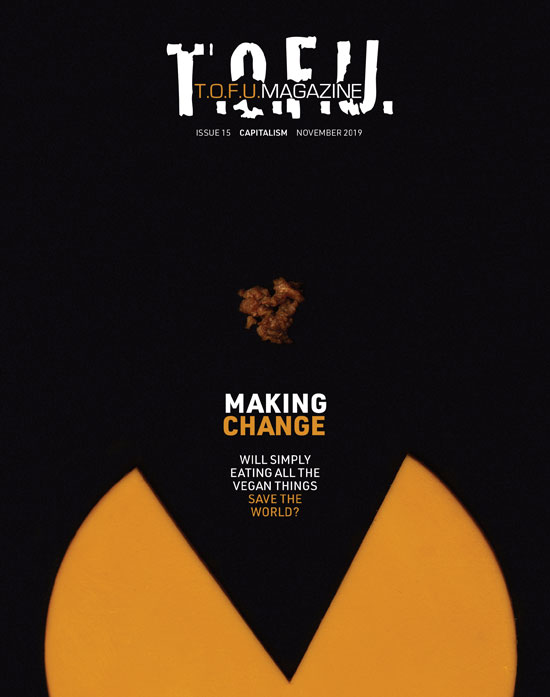
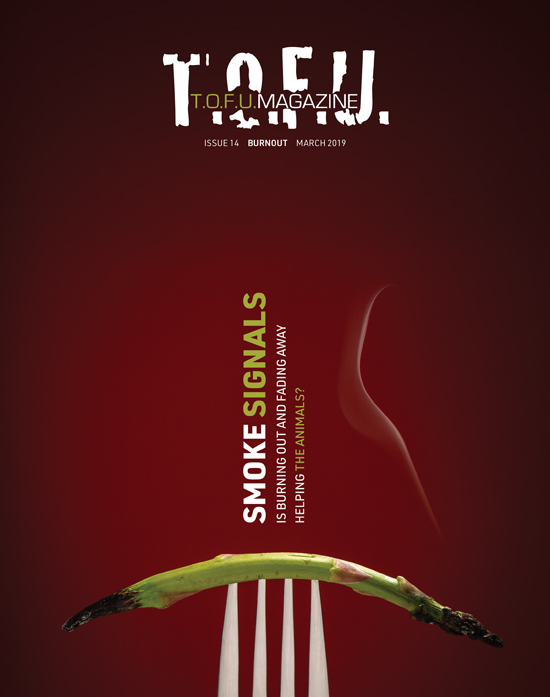
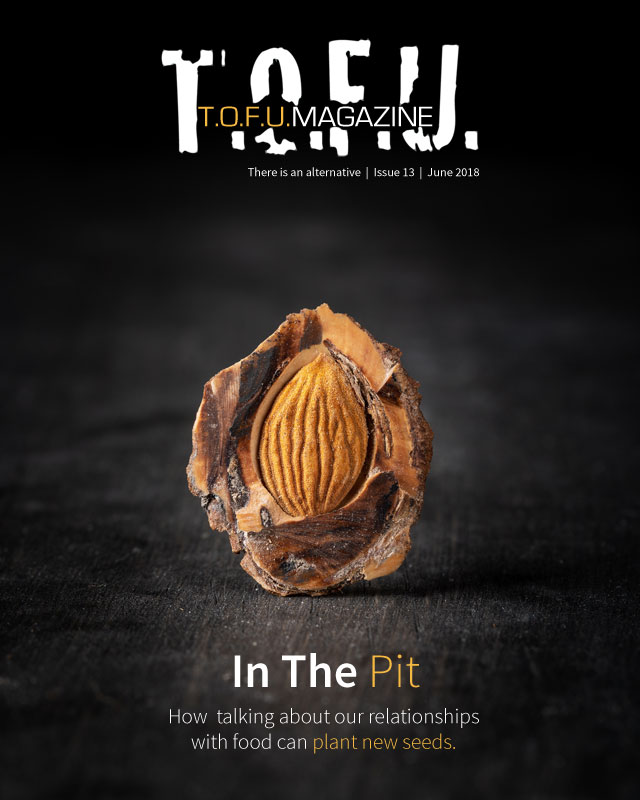
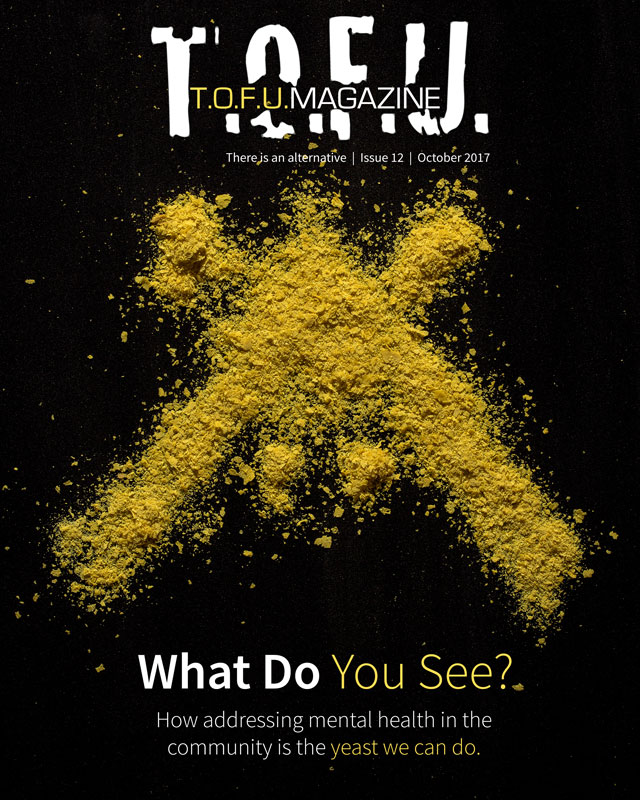
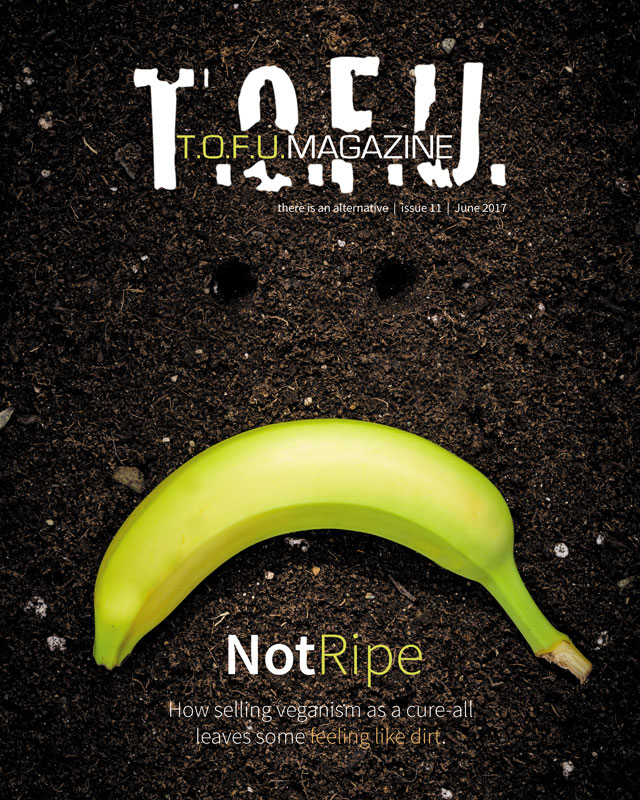
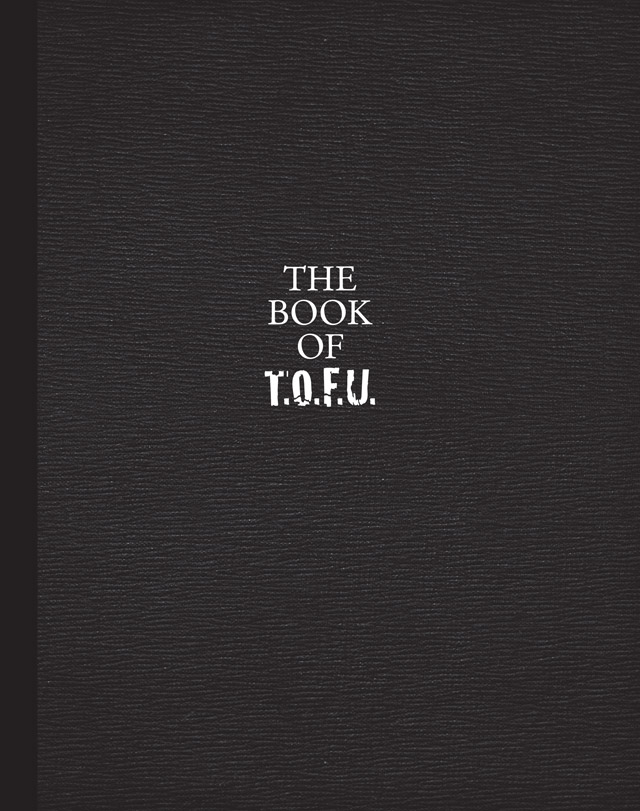
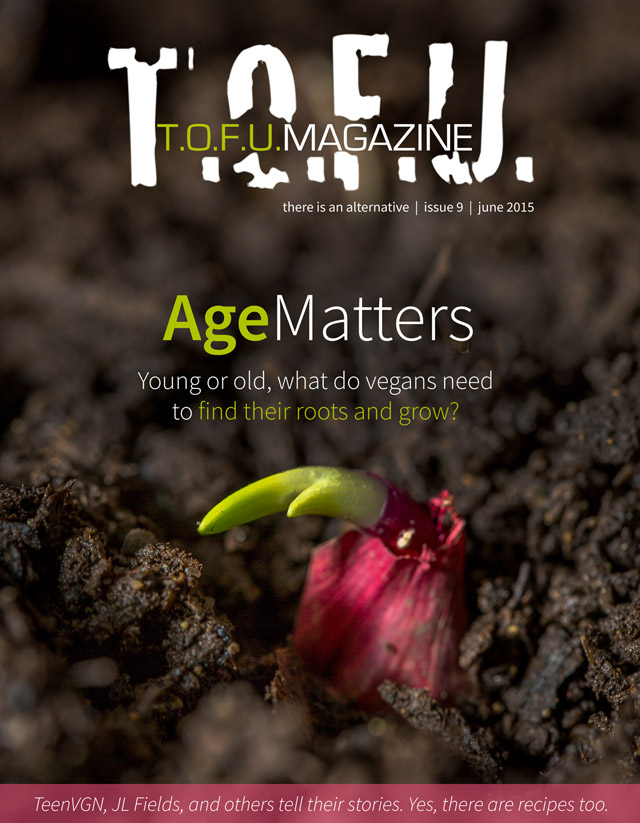
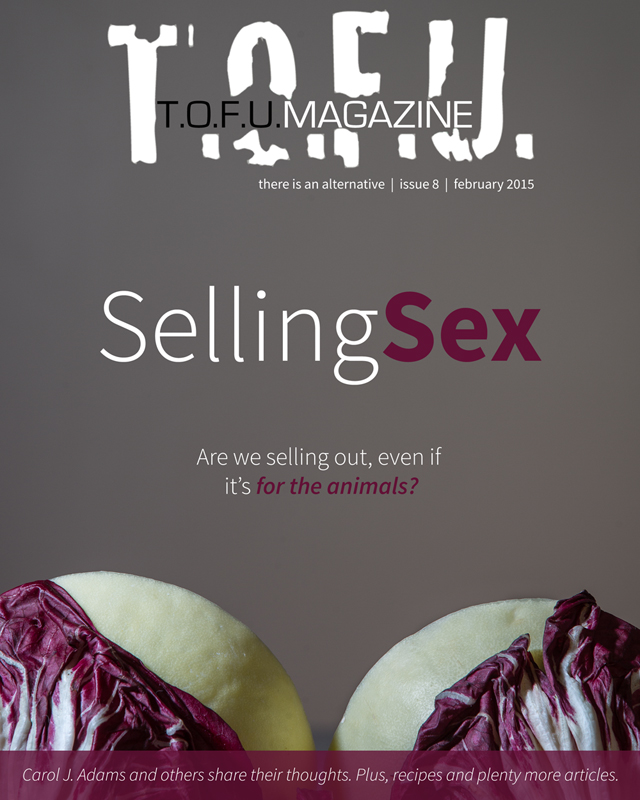
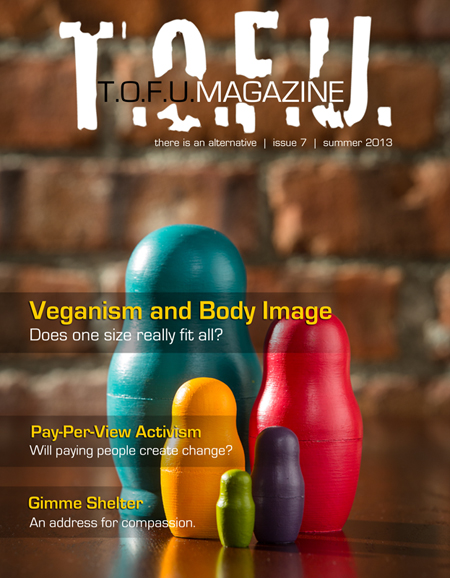
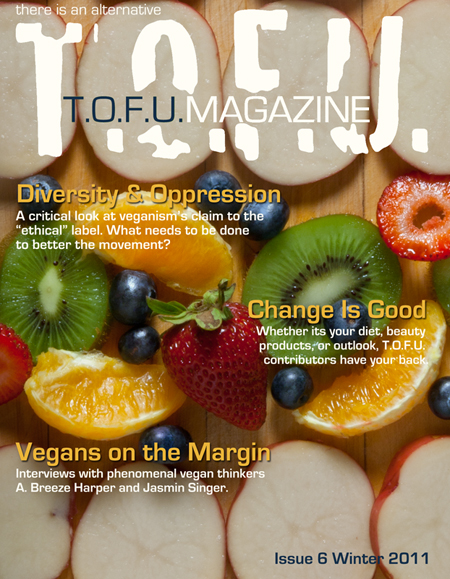
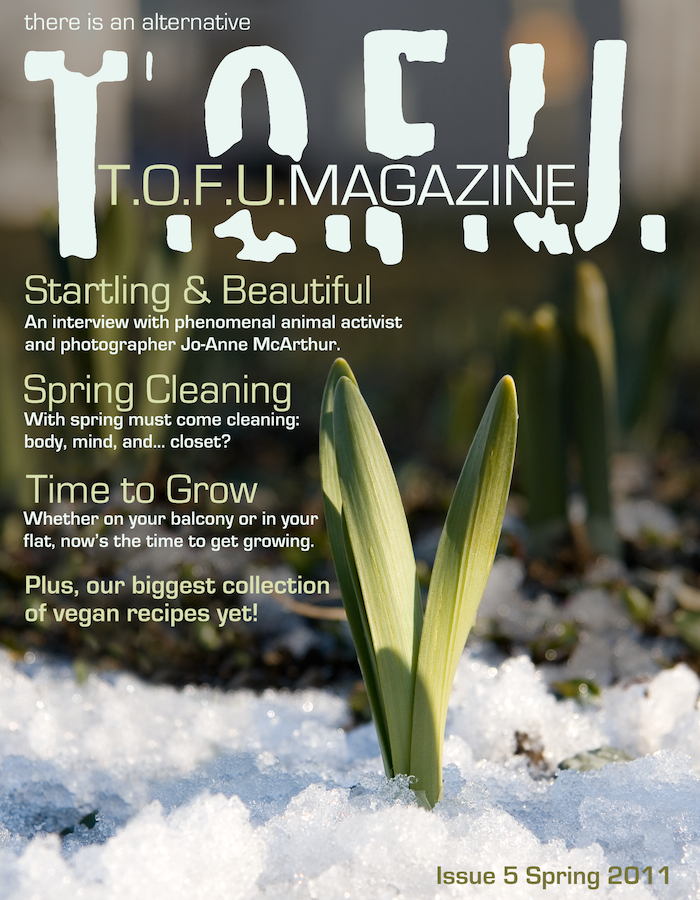
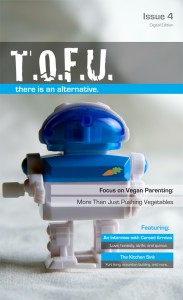
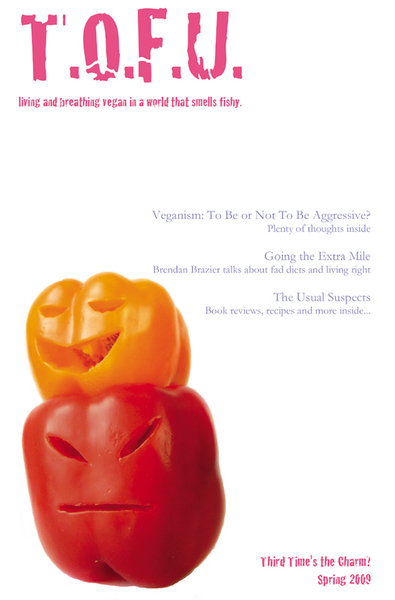
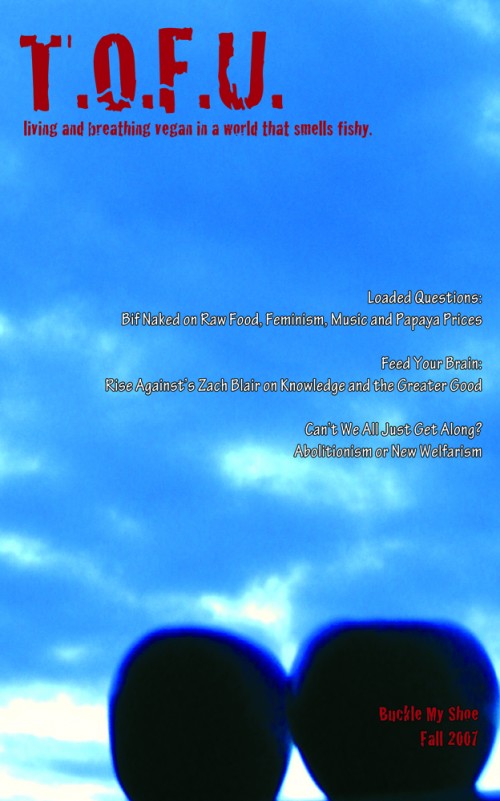
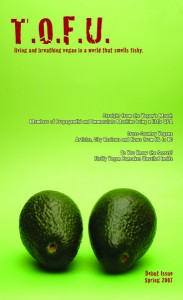
Pingback: How Jasmin Singer Lost 100 Pounds By Finding Peace With Herself | Rich Roll